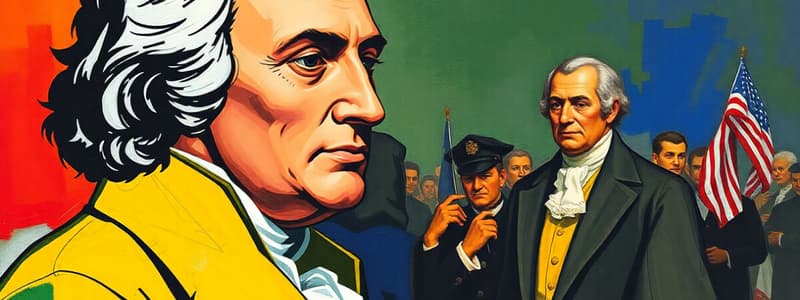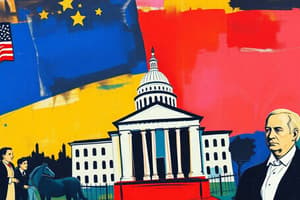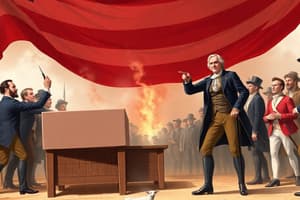Podcast
Questions and Answers
What significant legal case established the principle of judicial review in the United States?
What significant legal case established the principle of judicial review in the United States?
- Gibbons v. Ogden
- Brown v. Board of Education
- Marbury v. Madison (correct)
- Roe v. Wade
Which of the following individuals is best known for his role in the Abolition Movement and publishing 'The Liberator'?
Which of the following individuals is best known for his role in the Abolition Movement and publishing 'The Liberator'?
- Frederick Douglas
- Sojourner Truth
- Harriet Tubman
- William Lloyd Garrison (correct)
What was the primary goal of the Kansas-Nebraska Act of 1854?
What was the primary goal of the Kansas-Nebraska Act of 1854?
- To establish popular sovereignty in new territories (correct)
- To increase the power of the National Bank
- To initiate the Compromise of 1850
- To create a transcontinental railroad
Which term describes the strategy of inflicting heavy casualties on the enemy while wearing down their resources and morale?
Which term describes the strategy of inflicting heavy casualties on the enemy while wearing down their resources and morale?
Which movement sought to promote religious revival and led to the growth of new denominations in the early 19th century?
Which movement sought to promote religious revival and led to the growth of new denominations in the early 19th century?
Who was the primary author of the Calhoun Resolutions, which defended the right to slavery in the territories?
Who was the primary author of the Calhoun Resolutions, which defended the right to slavery in the territories?
Which event is most closely associated with the forced relocation of Native American peoples in the 1830s?
Which event is most closely associated with the forced relocation of Native American peoples in the 1830s?
Which agricultural innovation is attributed to Eli Whitney, which greatly impacted cotton production?
Which agricultural innovation is attributed to Eli Whitney, which greatly impacted cotton production?
What was a significant outcome of the Election of 1824 that is often referred to as the 'Corrupt Bargain'?
What was a significant outcome of the Election of 1824 that is often referred to as the 'Corrupt Bargain'?
Which of the following events is directly associated with the nullification crisis?
Which of the following events is directly associated with the nullification crisis?
What doctrine was favored by Stephen Douglas in relation to the Kansas-Nebraska Act?
What doctrine was favored by Stephen Douglas in relation to the Kansas-Nebraska Act?
Which factor significantly contributed to the shift towards Romanticism in American literature and culture?
Which factor significantly contributed to the shift towards Romanticism in American literature and culture?
Which of the following statements accurately describes the strategy of 'Attrition' during the Civil War?
Which of the following statements accurately describes the strategy of 'Attrition' during the Civil War?
Who played a critical role in the development of transportation technology during the early 19th century?
Who played a critical role in the development of transportation technology during the early 19th century?
Which group was significantly impacted by the Indian Removal Act of 1830, leading to a tragic relocation event known as the Trail of Tears?
Which group was significantly impacted by the Indian Removal Act of 1830, leading to a tragic relocation event known as the Trail of Tears?
What was one of the main reasons for the emergence of Utopian communities during the 19th century?
What was one of the main reasons for the emergence of Utopian communities during the 19th century?
Flashcards
Revolution of 1800
Revolution of 1800
The peaceful transfer of power from the Federalist Party to the Democratic-Republican Party, marked by Thomas Jefferson's election as president. This shift signified a change in political ideology and philosophy.
Marbury v. Madison
Marbury v. Madison
A landmark Supreme Court case that established the principle of judicial review, allowing the court to declare laws unconstitutional. It strengthened the judicial branch and its role in interpreting the Constitution.
Nullification Crisis
Nullification Crisis
A major political conflict between President Andrew Jackson and South Carolina over the issue of tariffs. South Carolina threatened to nullify (invalidate) the tariffs, leading to a standoff with the federal government.
Indian Removal Act of 1830
Indian Removal Act of 1830
Signup and view all the flashcards
The Whig Party
The Whig Party
Signup and view all the flashcards
Manifest Destiny
Manifest Destiny
Signup and view all the flashcards
The Abolition Movement
The Abolition Movement
Signup and view all the flashcards
Gettysburg Address
Gettysburg Address
Signup and view all the flashcards
Jeffersonian Democracy
Jeffersonian Democracy
Signup and view all the flashcards
Judiciary Act of 1801
Judiciary Act of 1801
Signup and view all the flashcards
Spoils System
Spoils System
Signup and view all the flashcards
Nullification
Nullification
Signup and view all the flashcards
Abolition Movement
Abolition Movement
Signup and view all the flashcards
Study Notes
The Revolution of 1800
- Thomas Jefferson's election marked a significant shift in American political power, demonstrating a transfer of presidential authority through peaceful means. Aaron Burr played a role in the election.
- The election sparked controversy and resulted in the development of a new political system.
- Disputes over the Judiciary Act of 1801 and the landmark Marbury v. Madison Supreme Court case shaped the balance of power between the legislative and judicial branches.
The Era of Good Feelings and the Rise of Jacksonian Democracy (1817-1840)
- The election of 1824 and the "Corrupt Bargain" highlighted the developing nature of the American political landscape.
- The Spoils System, the practice of rewarding political supporters with government positions, became a contested issue.
- Key figures such as John C. Calhoun, Henry Clay, and Martin Van Buren played crucial roles in shaping the political climate.
- The Eaton Affair, a significant social scandal, fueled political tensions impacting social and political dynamics.
- The Maysville Road Project, a controversial internal improvement project, reflected growing debates about federal involvement in local infrastructure.
- Arguments over nullification, the idea that states have the right to reject federal laws, sparked heated clashes. This led to the Nullification Crisis.
- The Webster-Hayne Debate further emphasized the ongoing struggle between federal and state power.
- The Indian Removal Act of 1830 led to the forced displacement of Native American tribes, resulting in the tragic Trail of Tears.
- Political skirmishes erupted, focusing on the national bank's role in the economy. Nicholas Biddle was involved in the Bank.
- Andrew Jackson's actions, such as killing the National Bank, represented a powerful shift in governance and financial policies.
- The Whig Party emerged as a political force, challenging the policies of Andrew Jackson's presidency. William Henry Harrison was involved.
Economic and Social Transformations
- Eli Whitney's invention of the cotton gin significantly impacted the agricultural landscape and economy.
- Developments spurred agricultural and transportation innovations, connecting and diversifying the American economy.
- Significant advancements emerged in technology, aiding both industries and society.
- The rise of immigration, impacting the demographics and political landscape.
- The Enlightenment ideas influenced American thought, culture, and social changes. Concepts like Calvinism, Deism, Unitarianism, and Universalism emerged and shaped religious thought.
- Religious upheavals like the Second Great Awakening influenced American society and spurred social reform movements, including temperance campaigns. Camp Meetings and Circuit Riders played a role. Figures like Francis Asbury and Charles G. Finney were prominent leaders in the movement.
- The rise of utopian communities, such as the Shakers, reflected social and religious experimentation. Joseph Smith and the Mormons were figures involved.
- The Romanticism movement characterized a profound shift in American literature and art, fostering emotional expression and individualism. Transcendentalism, with figures like Ralph Waldo Emerson and Henry David Thoreau, emerged as a philosophical movement.
Antebellum Reform and Manifest Destiny
- The gradual manumission and abolition debates shaped American society.
- The Abolition Movement, with influential figures like William Lloyd Garrison and Frederick Douglass, challenged the institution of slavery. The Liberator was a key publication.
- The Underground Railroad aided in escaping enslaved persons, a complex system of secretive routes to freedom. Harriet Tubman and Sojourner Truth were key figures.
- Manifest Destiny, the belief in America's right to expand westward, fueled westward expansion. John Tyler was involved.
- The Wilmot Proviso and Calhoun Resolutions embodied the division regarding the expansion of slavery into new territories.
- Popular sovereignty emerged as a concept. The Free Soil Coalition were involved as well.
- The Compromise of 1850 and the Kansas-Nebraska Act of 1854 attempted to resolve the growing sectional conflict regarding slavery's expansion, but instead further exacerbated the issue.
The Road to Civil War
- The conflict over slavery triggered violence and further division in American society.
- The California Gold Rush and other events spurred rapid westward expansion, which further exacerbated the conflict.
- The Republican Party emerged as a major political force as sectionalism escalated, seeking to contain slavery.
- "Bleeding Kansas" symbolized the escalating violence over the issue of extending slavery.
- Stephen Douglas's Kansas-Nebraska Act of 1854 set off a struggle over whether western territories would be free or slave states. The Fugitive Slave Act was enacted as well.
The Civil War (1861-1865)
- The Civil War, a defining conflict, had significant impacts on the nation's future.
- Tactics and Strategies employed during the war, and some early expectations surrounding the conflict, shaped its course. Concepts like the Strategy of Annihilation, Decisive Battle, Strategy of Attrition, and Strategy of Exhaustion were considered.
- The First Battle of Bull Run highlighted early expectations for a short war.
- The Anaconda Plan and the Union Navy's role in naval warfare, conscription, and pivotal figures like George McClellan, Robert E. Lee, and Ulysses S. Grant played key roles in the war.
- Battles like Shiloh, Antietam, Vicksburg, Gettysburg, and Atlanta were critical turning points during the Civil War. Peninsular Campaign, Second Battle of Bull Run, Battle of Fredericksburg, Battle of Chancellorsville, and Battle of Chattanooga were also significant engagements.
- The Emancipation Proclamation and the Gettysburg Address marked significant turning points in the war, shifting focus to ending slavery and enshrining national ideals.
- The 54th Massachusetts Regiment's bravery and contributions highlighted the changing social climate as events unfolded during the war.
- William Sherman's strategies exemplified Union successes, including Sherman's March to the Sea.
- The election of 1864 and the Trent Affair illustrate the political climate during the war, shaping the path forward.
- Ulysses S. Grant played a key role in Union victories in Northern Virginia. “The Battle Hymn of the Republic” was a popular song.
Studying That Suits You
Use AI to generate personalized quizzes and flashcards to suit your learning preferences.



